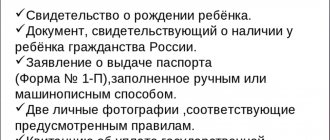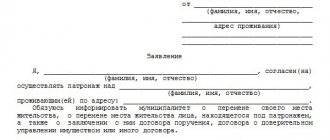Good afternoon, dear reader.
If the car belongs to a legal entity or individual entrepreneur, then control of this car can be transferred to the driver in various ways.
For example, a person may be officially employed in an organization as a driver, and in this case he uses a waybill.
The car can also be leased under a lease agreement.
This article discusses another popular option - issuing a power of attorney from a legal entity for the right to drive a car. This option may be useful for legal entities and entrepreneurs who do not want to deal with filling out travel forms on a daily basis.
In general, a power of attorney for a legal entity is very similar to a regular power of attorney for driving a car. They differ only in the details of the principal (the person who owns the vehicle).
The most important thing you need to know!
In the context of who is driving, from a legal point of view, there are 3 possible persons, and it is important to distinguish them in order to understand what documents should be in the car when stopped by a traffic police inspector:
- a driver is a person who is driving a car at a given moment in time, that is, influencing the control levers, it is he who has the obligation not only to have documents for the car with him, but also to hand over (namely hand over, and not just show) to a traffic police officer for inspection ,
- owner is the person who owns the right of ownership of the vehicle; confirming such a right is a purchase and sale agreement (and not a title, as some car enthusiasts believe),
- owner - should not be confused with the owner; this is the person to whom the owner has entrusted the right to own the car, and such right can be transferred orally by simply handing over the keys and documents for the car. The driver, who is not the owner of the car, is also its owner at a given moment in time.
Now let's look at what is required for the owner and at the same time the driver of a non-owner vehicle when he is driving on the road.
You will also be interested in:
- What is the fine and what else threatens for forgotten licenses and car documents?
- What documents need to be changed when changing your last name?
- Insurance without the owner of the car - can it be done and how?
What documents should always be in the car?
So, for a non-owner of a passenger car that is currently being used for personal needs, a standard set of documents is needed - exactly the same as if the owner were driving it. All of them are listed in paragraph 2.1.1 of the traffic rules.
Driver's license
Everything is simple here. This is the main document confirming that you can drive, in principle, regardless of who owns the vehicle you are driving. Your license must have a valid category for this particular car or motorcycle.
Registration certificate
This is the second paper needed in the machine. According to the practice of 2021, it is believed that in fact the issuance of the right of trust by the owner to the owner of the car is carried out by transferring to him the main document from the list - STS, pink plastic, confirming registration and containing registration data about the car.
This is what it looks like:
The registration certificate (also called “STS” or “SoRTS” for short) as of 2021 cannot be an electronic document, so you must always carry it with you.
OSAGO insurance
This is the third main document. It confirms the car owner’s obligation to insure liability in the event of an accident.
Depending on the type of policy, you may have 2 options for having the right to drive this car:
- if the OSAGO is limited, then you as a driver and your valid driver’s license must be included in the policy (in field No. 3),
- If the insurance is unlimited, then no one is included in the list of permitted drivers, which means that anyone can drive the car.
Thus, when the owner of the car transfers insurance to you, you need to make sure that either in paragraph 3 it is checked that the policy is unlimited, or your data is entered in the table below the checkbox about the limited liability of the insurance policy. This is in addition to the fact that you also need, of course, to look at the validity period of the insurance.
But this document, unlike the above, can be electronic. And in this case, when you stop, you must hand over the letter of the traffic rules to the traffic police, either a printed copy of it, or show it on the screen of your smartphone (clause 2.1.1(1) of the traffic rules). However, if you have neither one nor the other, then there is no penalty for it.
But we recommend checking one more important detail – the validity of the MTPL policy. This is necessary to ensure that in the event of an accident, the insurance company will pay for you, and not you from your own pocket. This is done through the official website of RSA - just select the policy series and enter its number. In the table that appears as a result of the check, the status column should read “owned by the policyholder.” If you were told that the insurance policy “is with the insurer” or did not find any information on the number, then this may be fake insurance. In this case it has no effect.
What are the penalties for absence?
There is a fine for the absence of each of these documents. They are small, but in addition to them, a costly security measure can be applied.
- For not having a driver's license with you, a fine of 500 rubles is imposed. It is subject to a discount, and you can pay 250 rubles in the first 20 days after the ruling is issued. Security cameras do not record this violation.
- If you do not have driving rights at all, they are expired or there is no corresponding category, then the fine will be from 5 to 15 thousand. But the main thing is that the one who gave you control of the car (most often the owner) will also be punished - he will be charged 30,000 rubles under Part 3 of Article 12.7 of the Code of Administrative Offenses of the Russian Federation.
- For driving without an STS, the fine is small - 500 rubles. However, in this case, evacuation to the impound lot is provided if the document is not delivered before the tow truck arrives.
- There are as many as 3 fines for compulsory motor liability insurance in 2021:
- the same 500 rubles if you simply forgot this document at home,
- 800 – if the owner did not buy compulsory motor liability insurance for this car at all, or the policy has expired,
- 500 rubles if you are not included in the current insurance.
Thus, if you forgot all these 3 documents at home, then the total fine will be 1,500 rubles, provided that you have all these documents for the car, you just did not take them with you.
powers of attorney
The power of attorney can be written in any form on a regular sheet of paper. There are no clear requirements for its execution; the main thing is to indicate a list of powers, so that later there will be no problems due to discrepancies. A handwritten power of attorney can be issued when transferring rights to register, undergo a technical inspection, or pick up a car from an impound lot.
If the full range of actions with the car is transferred to the authorized person, it is better to fill out a ready-made form.
You can have the document certified by a notary, but this is not necessary - it will be valid anyway if you provide all the necessary data.
Mandatory certification is required only in two cases:
- If the power of attorney is renewed in favor of one more person by the first principal. This is permitted by law. If you do not want the person to whom you transferred the car to entrust it to someone else, this must initially be indicated in the power of attorney: write down the clause “without the right of sub-assignment.”
- If the principal plans to travel abroad. If you plan to cross the border by car, it is better to have the document certified by a notary. This will help avoid problems in another state. Review the power of attorney requirements in your destination country. Some require a power of attorney with a translation into their language.
Also read: I purchased a car at a location other than my place of registration: is it possible to register it there?
What documents are definitely not needed?
Meanwhile, many car enthusiasts have doubts regarding certain documents for the car. Let's look at which of them you definitely won't need:
- PTS - according to the law, you do not need to carry it with you under any circumstances; but if we are talking about a newly purchased car, then there may be nuances (more on this below),
- a purchase and sale agreement is the only document certifying ownership of a car, but traffic regulations do not oblige you to carry it with you and present it to the inspector under any circumstances,
- a certificate from a driving school - you also do not need to have it in the car, and even if you have lost your driver’s license, such a certificate will not save you from a fine.
Do you need a passport?
A rather twofold situation arises with the main document proving the identity of a citizen. The fact is that, on the one hand, you do not have a direct obligation to carry it with you - nowhere in the laws of 2021 is this explicitly stated.
On the other hand, if you have violated something, then administrative material is compiled upon presentation of an identity document. But a driver's license is not like that.
But in practice today, a driver’s license is often enough for a traffic police inspector to issue a fine or other punishment. Although formally this requires a passport, in its absence the Police Law obliges the officer to take you to the department until your identity is clarified.
Do you need a power of attorney?
The problem many car enthusiasts have is that when they drive someone else's car with unlimited insurance, they essentially cannot prove that the car was not stolen. After all, owners often leave STS and insurance policies in the glove compartment!
It naturally follows that there must be a power of attorney for the right to dispose of the vehicle. But this pattern is not supported by law.
Indeed, this paper has a place in law. However, it is not required to be presented to the traffic police inspector on the road, just as its absence will cause more problems.
There are, of course, several subtleties with a power of attorney:
- if it is included in the case materials, the owner who entrusted you with the car may be charged with transferring control to you when you are held liable under certain articles (for example, for not having a driver’s license with you or for intoxication),
- a power of attorney can be used not only for management, but also, for example, for the right to sell a car or carry out registration actions; and in such cases it must be communicated in writing to the appropriate persons.
In general, by handing over the keys to the car and the right to own it, the owner is essentially giving you an oral power of attorney. But a traffic police officer on the road has no right to demand written paper from you. He may ask you to prove that you did not steal the car, but you have the right to refuse him.
Something else useful for you:
- What changes are being introduced to driver’s licenses, STS and PTS from December 1, 2021?
- Do I need to replace documents for a car when my registration address changes and which ones?
- What is the amount of state fees (registration certificate, license, PTS and license plates)?
Do I need to certify?
The legislation of the Russian Federation does not oblige the power of attorney to be certified by a notary, the exception is if it is not issued as a general power of attorney. Despite this, organizations try not to miss this point and turn to notaries for help.
Important! A power of attorney will have greater legal force if it is certified by a notary.
Expert opinion
Artemyev Dmitry
Experience as a forensic expert in the field of automotive technical examination for more than 2 years, more than 3 years of work in the field of insurance disputes, appealing guilt in road accidents.
Ask a Question
The organization decides whether to certify the document or not; the organization’s seal and signatures of both parties will be on it. In various situations on the road, it becomes necessary to have a notarized trust document, and this will complicate the driver’s movement and limit his time capabilities.
If you recently purchased a car
As we found out above, in order to be able to drive a car, STS and a compulsory motor liability insurance policy are required in the list of documents.
Here a reasonable question arises about what to do if you bought a new car at a car dealership and you do not have the specified documents. The new law of 2021 gives the full right to drive for 10 days without registration and insurance. Is there a contradiction here?
In fact, in this situation, the current legislation differs from law enforcement practice. By law, in this case, you are required to hand over only your driver’s license to the traffic police officer for verification, verbally indicating that 10 days have not passed since the purchase of the car. And the inspector, due to irremovable doubts about your guilt, must wish you a good trip and let you go.
In fact, inspectors often try to punish the driver and demand, in addition to his license:
- sales contract to confirm the date of purchase of the car,
- PTS with the corresponding entry.
Moreover, options are possible when an employee asks for both documents, or when only any of them. It's up to you to decide what to do! On the one hand, if you want to spend as little time as possible communicating with the traffic police, take this set of documents with you. Otherwise, a possible fine can be easily appealed, and when filing a complaint, you will simply attach a copy of the DCP to confirm the illegality of the punishment.
If we are talking about a used car, then there is already a registration certificate for it, so the obligation to hand it over for inspection does not go away. But you still have the right to apply for compulsory motor liability insurance within 10 days after the date of purchase of the car.
What determines the validity period?
The period of legitimacy of the power of attorney to drive a car can be specified in the text. If there is no phrase about the period of validity, the period is limited to 12 months from the date of the document. This regulation is prescribed in the Civil Code of the Russian Federation.
The validity period of a power of attorney for a car is limited by several parameters:
- the expiration of the time specified in the document;
- refusal of the authorized representative;
- cancellation by the owner of the vehicle;
- liquidation of the owner organization;
- death of the owner or recognition of his incompetence;
- death or incapacity of a trusted person.
According to the new law, the validity period of the permit is a maximum of 3 years. The limitation is valid both for a general power of attorney and a relatively simple form of written expression of will.
When and who needs a waybill?
Waybills are required if both of the following conditions are met:
- you carry out commercial activities in transport,
- you are currently transporting luggage and/or passengers.
This is regulated by Federal Law No. 259 on the Motor Transport Charter. Its Article 1 prescribes that the law applies to vehicles that provide services. And Article 6 obliges in such cases to have a completed waybill with you.
In addition, it is mandatory for a taxi driver to carry a license to carry out this activity.
What documents are needed for a legal entity’s car?
Cars owned by legal entities must also be registered with the traffic police and insured. Therefore, in this case, the standard set of documents includes a driver’s license, STS and a compulsory motor liability insurance policy. But, in addition to them, you will need:
- written power of attorney from the organization in all cases,
- waybill, if you are currently carrying out commercial transportation of baggage, cargo or passengers,
- documents confirming a routine medical examination if you are an employee of a legal entity.
Price
If a notary draws up the required power of attorney without its certification, a legal organization will have to pay about 1,200 rubles.
Important! The amounts differ in different regions and cities.
If notarization is required, the organization will pay an additional 500 rubles.










